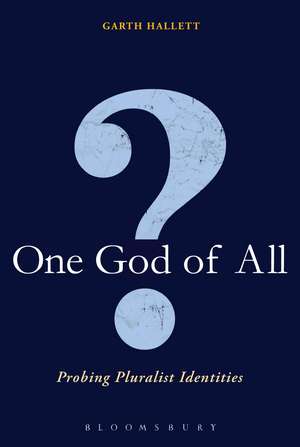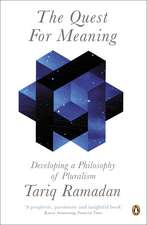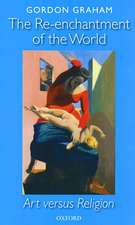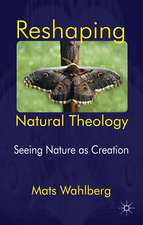One God Of All?: Probing Pluralist Identities
Autor Garth Halletten Limba Engleză Paperback – 25 iul 2012
| Toate formatele și edițiile | Preț | Express |
|---|---|---|
| Paperback (1) | 254.64 lei 6-8 săpt. | |
| Bloomsbury Publishing – 25 iul 2012 | 254.64 lei 6-8 săpt. | |
| Hardback (1) | 771.42 lei 6-8 săpt. | |
| Bloomsbury Publishing – 22 dec 2010 | 771.42 lei 6-8 săpt. |
Preț: 254.64 lei
Preț vechi: 329.70 lei
-23% Nou
Puncte Express: 382
Preț estimativ în valută:
48.72€ • 50.88$ • 40.24£
48.72€ • 50.88$ • 40.24£
Carte tipărită la comandă
Livrare economică 15-29 aprilie
Preluare comenzi: 021 569.72.76
Specificații
ISBN-13: 9781441170484
ISBN-10: 1441170480
Pagini: 160
Dimensiuni: 156 x 234 x 8 mm
Greutate: 0.22 kg
Editura: Bloomsbury Publishing
Colecția Continuum
Locul publicării:New York, United States
ISBN-10: 1441170480
Pagini: 160
Dimensiuni: 156 x 234 x 8 mm
Greutate: 0.22 kg
Editura: Bloomsbury Publishing
Colecția Continuum
Locul publicării:New York, United States
Caracteristici
Broad overview of a much-debated issue in contemporary theology and philosophy of religion.
Notă biografică
Garth Hallett, SJ, was formerly Dean of the College of Philosophy and Letters at Saint Louis University, USA. He has previously published fourteen books, including A Middle Way to God (2000), Identity and Mystery in Themes of Christian Faith (2005), and Linguistic Philosophy: The Central Story (2008).
Cuprins
Preface 1. Pluralist Identity Claims: A Preliminary Overview 2. The Claims' Significance 3. Fixing a Focus4. Transcendent Reference 5. For and Against Identical Reference 6. Neglected Questions 7. Multiple Misgivings 8. Counter-Exploration 9. Dialectical Response 10. Pluralism in a New Key? Notes Works Cited
Recenzii
One God of All? is a remarkable achievement that brings needed clarity, religiously sensitive and philosophically incisive, to the debates surrounding today's religious diversity. With Wittgenstein as his ally and John Hick his major debating partner, Hallett offers specific and penetrating insights into how we experience diversity and put it into words, and shows how we can sensibly think it through, without surrendering to fideism or relativism. This book should be a necessary reference for all those wishing to philosophize the meaning of today's pluralism.
Hallett's Wittgensteinian sensitivities produce a fresh and original contribution to the critical examination of the pluralist thesis (all religions point to the same God). In his attention to the many problems of pluralism, he is able to tentatively but instructively develop a new approach to this vexed question.
It may seem plausible to argue that the same divine reality - whether called God, Allah, Tao, or Sunyata - is active in all religions. But what is meant by words like 'same' when applied to terms which are themselves strictly beyond definition? Language, and the way we use and mis-use it, is Hallett's theme. Indeed proper attention to language and the way in which it is used to speak of identity and individuation may open up some of the ethical, as much as philosophical, questions which underlie one of the most important theological issues of our time.
Those who are well read in the field of religious pluralism will find this book a pleasant change from the typical debates concerning whether or why Allah, Vishnu, Tao, Brahman, Yahweh, God, and nirvana are one and the same. One God of All? is an important reminder to take a step back and consider the meaning, and not just the apparent truth, of the claims that are being made... The work is clear, careful, and in true Wittgensteinian fashion, provides the reader with an ample diet of examples.
Hallett's Wittgensteinian sensitivities produce a fresh and original contribution to the critical examination of the pluralist thesis (all religions point to the same God). In his attention to the many problems of pluralism, he is able to tentatively but instructively develop a new approach to this vexed question.
It may seem plausible to argue that the same divine reality - whether called God, Allah, Tao, or Sunyata - is active in all religions. But what is meant by words like 'same' when applied to terms which are themselves strictly beyond definition? Language, and the way we use and mis-use it, is Hallett's theme. Indeed proper attention to language and the way in which it is used to speak of identity and individuation may open up some of the ethical, as much as philosophical, questions which underlie one of the most important theological issues of our time.
Those who are well read in the field of religious pluralism will find this book a pleasant change from the typical debates concerning whether or why Allah, Vishnu, Tao, Brahman, Yahweh, God, and nirvana are one and the same. One God of All? is an important reminder to take a step back and consider the meaning, and not just the apparent truth, of the claims that are being made... The work is clear, careful, and in true Wittgensteinian fashion, provides the reader with an ample diet of examples.
Descriere
Descriere de la o altă ediție sau format:
Investigates and subjects to philosophical analysis, the claim that a single transcendent being is present or active in all of the world's major religions. This book scrutinizes the soundness of this critique, its broad implications, and the possibility of replacing empty identity claims with suitable parables or comparisons.
Investigates and subjects to philosophical analysis, the claim that a single transcendent being is present or active in all of the world's major religions. This book scrutinizes the soundness of this critique, its broad implications, and the possibility of replacing empty identity claims with suitable parables or comparisons.














